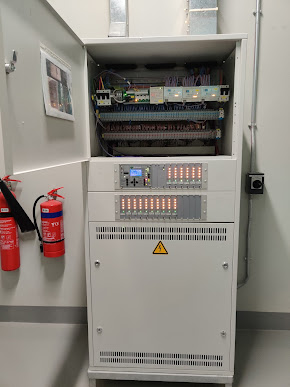Why Central Battery Systems Are a Game-Changer for Safety and Efficiency
In an emergency, reliable lighting can make the difference
between a safe evacuation and chaos. Central
Battery Systems (CBS) are revolutionizing emergency lighting by
offering a more efficient, reliable, and scalable solution compared to
traditional self-contained systems. Whether for commercial buildings,
hospitals, or large industrial complexes, CBS ensures consistent power
distribution and simplified maintenance, making them an essential choice for
modern infrastructure.
What Is a Central Battery System?
A Central Battery System is a centralized power supply that
controls and powers all emergency lighting units in a building. Unlike
self-contained emergency lights that rely on individual batteries, CBS uses a
single, high-capacity battery bank located in a dedicated control room. The
system ensures that emergency lights function optimally during power outages,
improving safety and compliance with fire safety regulations.
Key Benefits of Central Battery Systems
1. Increased Reliability and Longer Battery Life
One of the most significant advantages of CBS is its
superior reliability. The batteries in a CBS are maintained under optimal
conditions, leading to an extended lifespan—often up to 10 years, compared to
the 3-4 years typical of self-contained units. Since all components are housed
in a controlled environment, they are less susceptible to temperature
fluctuations and degradation.
2. Simplified Maintenance and Testing
Unlike self-contained systems, where each emergency light
must be tested individually, CBS allows centralized monitoring and maintenance.
Facility managers can conduct automatic self-tests and generate compliance
reports without manually checking each unit. This reduces labor costs and
ensures that issues are detected and resolved promptly.
3. Cost-Effective in the Long Run
While the initial installation cost of a CBS may be higher
than a self-contained system, its long-term benefits outweigh the investment.
Reduced maintenance, lower replacement costs, and improved energy efficiency
lead to significant cost savings over time. Additionally, CBS requires fewer
battery replacements, further cutting down operational expenses.
4. Enhanced Safety and Compliance
CBS systems are designed to meet stringent safety
regulations, including EN 50171 and BS 5266-1 standards for emergency lighting.
They offer higher system reliability, ensuring that emergency lights remain
operational during power failures. Many CBS setups also include automatic
monitoring systems that provide real-time alerts in case of battery failure,
wiring issues, or other malfunctions.
5. Energy Efficiency and Environmental Benefits
By centralizing battery power, CBS significantly reduces
energy waste. Unlike self-contained systems that require continuous charging
for multiple individual batteries, CBS optimizes power distribution, lowering
overall energy consumption. Additionally, fewer battery replacements reduce
electronic waste, making CBS a more sustainable solution.
6. Scalable and Flexible for Large Buildings
CBS is particularly beneficial for large facilities like
office buildings, shopping malls, airports, and hospitals. It allows for
centralized control over numerous emergency lights across vast spaces, ensuring
uniform performance. As buildings expand or undergo modifications, CBS can be
easily scaled without major infrastructure changes.
7. Integration with Building Management Systems
(BMS)
Modern CBS solutions are designed to integrate seamlessly
with Building Management Systems (BMS). This allows facility managers to
monitor emergency lighting alongside fire alarms, security systems, and HVAC
controls. Such integration enhances building-wide safety coordination and
simplifies facility management.
Conclusion
Central Battery Systems are
setting new standards for emergency lighting by offering enhanced reliability,
efficiency, and ease of maintenance. Whether you’re managing a high-rise
building, a hospital, or an industrial complex, switching to a CBS can improve
safety, reduce costs, and ensure compliance with regulatory standards.
Investing in a CBS today means future-proofing your emergency lighting system
for years to come.




Comments
Post a Comment